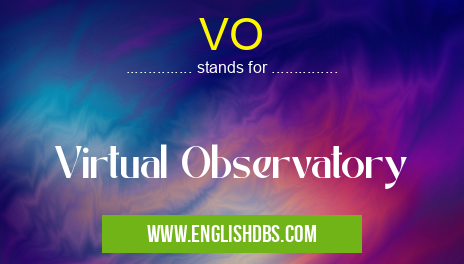What does VO mean in UNCLASSIFIED
Abbreviation "VO" stands for Virtual Observatory. It is a widely used term in the field of digital technology and refers to an online repository where astronomy data is stored. The data includes astronomical objects, images, catalogs, and other related information that can be accessed through the internet. VO also provides tools and services to facilitate the exploration and analysis of astronomy data. With these tools and services, astronomers are able to easily find, analyze and visualize their data in a user-friendly way.

VO meaning in Unclassified in Miscellaneous
VO mostly used in an acronym Unclassified in Category Miscellaneous that means Virtual Observatory
Shorthand: VO,
Full Form: Virtual Observatory
For more information of "Virtual Observatory", see the section below.
Benefits Of Virtual Observatory For Astronomers
One of the main advantages of using VO is its ability to allow researchers to interact with large amounts of astronomical information at once without complicated programming or scripting knowledge. Data can be accessed from a variety of different databases located all over the globe including those maintained by individual institutions or international organizations such as NASA or ESA (European Space Agency). In addition to allowing quick access to diverse datasets, VO also provides tools that simplify complex tasks such as comparing images from different databases or combining multiple datasets into a single viewable format. Finally, since all virtual observatories are connected via the internet they provide geographically distributed users with easy access all over the world no matter their location or time zone difference with other countries or regions.
Essential Questions and Answers on Virtual Observatory in "MISCELLANEOUS»UNFILED"
What is the Virtual Observatory (VO)?
The Virtual Observatory (VO) is a global network of astronomical data archives, services, and tools which can be used to enable scientific research in astronomy and astrophysics. It allows astronomers to access, analyze, process and visualize large amounts of complex data from different telescope facilities around the world.
What does VO do?
The VO enables scientists to collect, share, analyze, publish and use astronomical data and information with ease. Its distributed architecture makes it possible for users to access different types of astronomical data from various sites all over the world. It also provides the necessary software infrastructure for developing applications related to Astronomy.
Who created the VO?
The VO was created by an international consortium of astronomy organizations known as AstroGrid-VO. This consortium consists of institutions from Australia, Canada, Europe, India, Japan and the United States. Together they are working on creating a unified platform for accessing various kinds of astronomical data.
Is there any cost associated with using the VO?
No, there is no cost associated with using the services provided by the VO. All services are free to use however some additional charges may be applied when using certain datasets or tools in order to access higher quality or more detailed data which would otherwise not be available without an additional fee.
Can I get help if I have questions about how to use the services offered by the VO?
Yes! There are many online forums where you can find answers for your questions regarding how to use services that are provided by the VO. Additionally there are several user service desks that can help you with any inquiries you may have regarding how to best utilize its features.
How can I contribute to development of VO?
You can contribute directly via open source projects such as AstroGrid-VO’s GitHub repository or provide feedback through application surveys or other types of user questionnaires. Additionally one could work together with other researchers in Astronomy & Astrophysics and join their collaborations or participate in discussions concerning improvements that could be made in order for users to better benefit from its resources.
How secure is my data when using the VO?
Your data security is taken very seriously by AstroGrid-VO Consortium who have implemented numerous protocols in order ensure its security at all times. All sensitive user information stored within their systems remain protected thanks to their encryption methods as well as other protocols such as two factor authentication which make sure that only verified users have access your information.
What type of hardware/software do I need in order for me to use the services offered by the VO?
In terms of hardware requirements you will need a computer with adequate processing power and storage capacity as well as a reliable internet connection in order access most of its features. In terms o software requirements, most popular web browsers should suffice but specific plugins might need installation depending on what type of activity you wish carry out.
Final Words:
In conclusion, Virtual Observatory (VO) is an important tool for digital astronomy research today due its ability to store large amounts of data from multiple sources in an accessible way as well as its powerful analytical capabilities that simplify complex tasks while saving time and effort for researchers across the globe. With its growing popularity among astronomers worldwide it could potentially become even more influential as new technologies continue advancing in this field.
VO also stands for: |
|
| All stands for VO |
